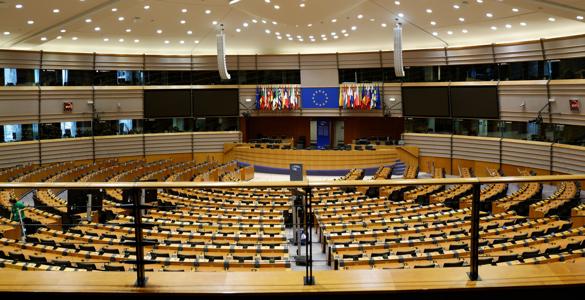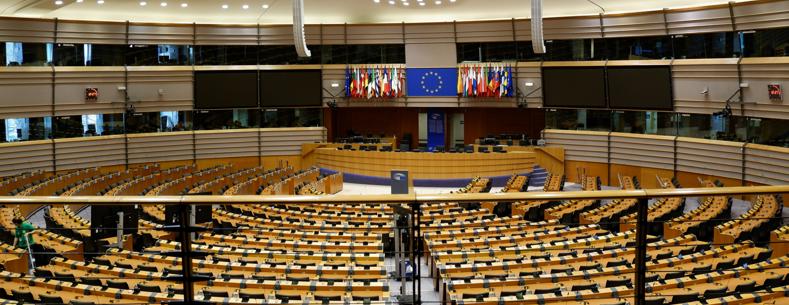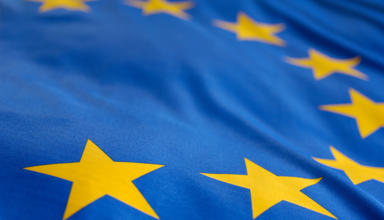Against the backdrop of difficult headlines and another tumultuous period in UK-EU relations, parliamentarians from the UK and EU came together in Brussels on 12-13 May. It was the first meeting of the Parliamentary Partnership Assembly (PPA), a new forum set up under the Trade and Cooperation Agreement (TCA).
They discussed the Northern Ireland Protocol, security cooperation and the war in Ukraine and future cooperation on areas such energy, climate change, research and innovation.
The Senedd was represented by members of its Legislation, Justice and Constitution Committee, Alun Davies MS, and the Economy, Trade and Rural Affairs Committee, Sam Kurtz MS.
What is this new forum?
The UK-EU Trade and Cooperation Agreement (TCA) establishes the post-Brexit relationship between the UK and the EU. It creates over 20 forums to oversee its operation and implementation. One of these is the PPA, made up of delegations from the UK and European parliaments. It is the only forum which provides for joint scrutiny of the TCA and has powers to make recommendations, request information and be informed of decisions.
Our previous article sets out where the PPA sits within the TCA’s overall structure..
What was discussed?
Three matters of international significance dominated the discussions. The content of the discussions offer a glimpse of how matters not covered by the TCA could spill over and impact its future implementation.
The on-going disagreements over the Withdrawal Agreement’s Northern Ireland Protocol featured heavily in the discussions. The Assembly heard from the EU Commission Vice-President Marôs Sěfčovič and Rt.Hon Michael Ellis, UK Cabinet Minister. Implementation of the Protocol is a key issue for Welsh ports and businesses.
Commissioner Sěfčovič made it clear that the EU is willing to discuss solutions to practical problems caused by the implementation of the Protocol but that renegotiation is not an option. Mr Ellis rejected the EU’s current proposals and called on it to adopt a new position for the on-going talks or warned the UK could take further action. The UK Government has since announced its intention to introduce legislation that would allow it to unilaterally disapply parts of the Protocol in the coming weeks.
President of the European Parliament, Roberta Metsola, said a key role for the Assembly and its delegates will be to keep the dialogue flowing between their constituencies to ensure a positive and stable relationship.
The war in Ukraine’s impact on the security of the continent and the collective UK and EU response to it featured in addresses from Stefan Saninno, Director General of the EU’s External Action Service, and the UK Minister for the armed forces, James Heappey.
Assembly members discussed practical actions needed to support Ukrainians and the associated energy and food security crises. Ways to re-build and strengthen EU-UK security and foreign policy cooperation post-Brexit in general was debated. The Senedd has frequently discussed Wales’ response to the war in Ukraine since Russia’s invasion, particularly its humanitarian response,
Rising energy prices and reliance on Russian fossil fuels have brought energy security into sharp focus. Delegates discussed how strengthened UK-EU cooperation could help tackle this issue. Our guide explains how the UK and EU agreed to cooperate on the environment, climate and energy after Brexit.
The importance of EU and UK continuing to show global leadership on climate change was a common point raised by speakers. The fight against climate change constitutes an essential element of the TCA. Many speakers focused on this part of UK-EU cooperation and endorsed its ambition. Senedd Committees have been scrutinising areas of post-Brexit climate change cooperation such as the establishment of a new UK emissions trading system and new UK common frameworks on air quality.
What is the Senedd’s role?
The Senedd, along with other devolved legislatures, were invited to send two observers to the meeting. Observers have no automatic right to speak and so cannot contribute to discussions. This is the same status afforded to the Welsh and devolved governments at TCA meetings, including at its oversight body, the Partnership Council.
The Welsh Government’s Minister for Economy, Vaughan Gething MS has said this is a “deeply unsatisfactory” position which the “Welsh Government cannot credibly support”.
In a letter to the Chair of the UK Delegation, the Chair of the Senedd’s Legislation, Justice and Constitution Committee, has expressed his hope that Senedd Members will be able to speak on devolved matters at future meetings of the Parliamentary Partnership Assembly.
Its next meeting will take place in London in autumn 2022.
Article by Nia Moss & Sara Moran, Senedd Research, Welsh Parliament






